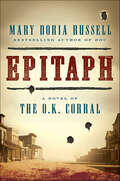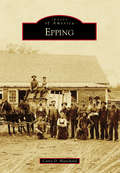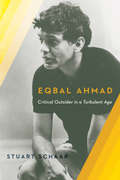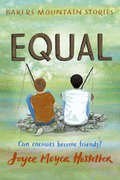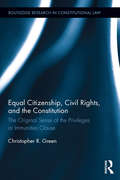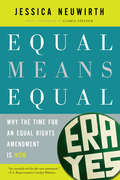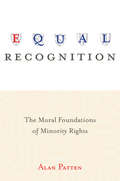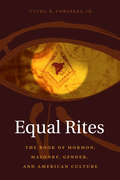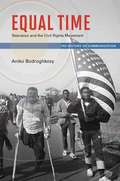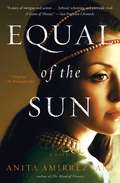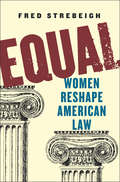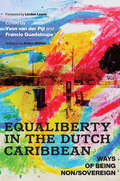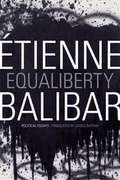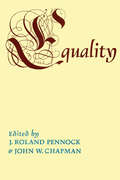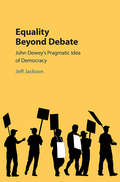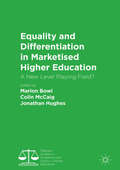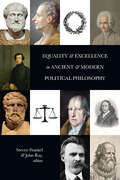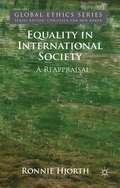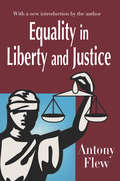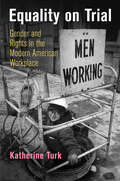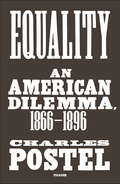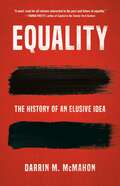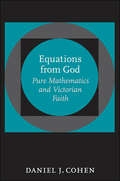- Table View
- List View
Epitaph: A Novel of the O.K. Corral
by Mary Doria RussellMary Doria Russell, the bestselling, award-winning author of The Sparrow, returns with Epitaph. An American Iliad, this richly detailed and meticulously researched historical novel continues the story she began in Doc, following Wyatt Earp and Doc Holliday to Tombstone, Arizona, and to the gunfight at the O.K. Corral.A deeply divided nation. Vicious politics. A shamelessly partisan media. A president loathed by half the populace. Smuggling and gang warfare along the Mexican border. Armed citizens willing to stand their ground and take law into their own hands. . . . That was America in 1881.All those forces came to bear on the afternoon of October 26 when Doc Holliday and the Earp brothers faced off against the Clantons and the McLaurys in Tombstone, Arizona. It should have been a simple misdemeanor arrest. Thirty seconds and thirty bullets later, three officers were wounded and three citizens lay dead in the dirt.Wyatt Earp was the last man standing, the only one unscathed. The lies began before the smoke cleared, but the gunfight at the O.K. Corral would soon become central to American beliefs about the Old West.Epitaph tells Wyatt’s real story, unearthing the Homeric tragedy buried under 130 years of mythology, misrepresentation, and sheer indifference to fact. Epic and intimate, this novel gives voice to the real men and women whose lives were changed forever by those fatal thirty seconds in Tombstone. At its heart is the woman behind the myth: Josephine Sarah Marcus, who loved Wyatt Earp for forty-nine years and who carefully chipped away at the truth until she had crafted the heroic legend that would become the epitaph her husband deserved.
Epping (Images of America)
by Corey BlanchardWith its lush forests, fertile land, and abundant waterways, Epping began attracting European settlers as early as 1710 before incorporating as an independent town in 1741. The town became home to successful farms, lumber operations, and mills built along the Lamprey River. Clay that lay beneath the fertile soil emerged as an important resource when commercial brickyards began popping up all over town in 1822. Epping became a crossroads for multiple rail lines, which spurred economic development and population booms. In 1862, undeveloped land became home to the Methodist campground Camp Hedding. Factories, especially those specializing in shoes, were established in the area as well. Epping's industrial concerns lasted until the late 20th century, when it grew as a retail center at the junction of Routes 101 and 125. Epping has been home to prominent residents, including a Revolutionary War general, three New Hampshire governors, a world heavyweight boxing champion, the first person to circumnavigate the world on a motorcycle, and a female collegiate basketball great.
Eqbal Ahmad: Critical Outsider in a Turbulent Age
by Stuart SchaarEqbal Ahmad (1930?–1999) was a bold and original activist, journalist, and theorist who brought uncommon perspective to the rise of militant Islam, the conflict in Kashmir, the involvement of the United States in Vietnam, and the geopolitics of the Cold War. A long-time friend and intellectual collaborator of Ahmad, Stuart Schaar presents in this book previously unseen materials by and about his colleague, having traveled through the United States, India, Pakistan, western Europe, and North Africa to connect Ahmad's experiences to the major currents of modern history.Ahmad was the first to recognize that former ally Osama bin Laden would turn against the United States. He anticipated the rapidly shifting loyalties of terrorists and understood that overthrowing Saddam Hussein would provoke violence and sectarian strife in Iraq. Ahmad had great compassion for the victims of the proxy wars waged by the leading Cold War powers, and he frequently championed unpopular causes, such as the need to extend the rights of Palestinians and protect Bosnians and Kosovars in a disintegrating Yugoslavia. Toward the end of his life, Ahmad worked tirelessly to broker a peace between India and Pakistan and to prevent the spread of nuclear weapons throughout the subcontinent. As novel and necessary as ever, Ahmad's remarkable vision is here preserved and extended to reveal the extent to which he was involved in the political and historical conflicts of his time.
Equal
by Joyce Moyer HostetterHere is a riveting coming-of-age story about the importance of staying true to yourself and the essential power of friendship in this fifth and final title in the popular Bakers Mountain Stories series.It's the summer of 1959 at the foot of Bakers Mountain in western North Carolina when 13-year-old Jackie Honeycutt first bumps into Thomas Freeman fishing on the riverbank. They hit it off, and Jackie hopes the two of them can be friends. But Jackie is white, and Thomas is Black -- and Jackie quickly learns their growing friendship won't be easy. North Carolina is the focus of the growing civil rights movement, and through his friendship with Thomas, Jackie experiences racism and prejudice first-hand through bullying at school, family turmoil and pressure from his community. Can Jackie free both his conscience and his voice - and ultimately do what's right?
Equal Citizenship, Civil Rights, and the Constitution: The Original Sense of the Privileges or Immunities Clause (Routledge Research in Constitutional Law)
by Christopher GreenThe Privileges or Immunities Clause of the Fourteenth Amendment is arguably the most historically important clause of the most significant part of the US Constitution. Designed to be a central guarantor of civil rights and civil liberties following Reconstruction, this clause could have been at the center of most of the country's constitutional controversies, not only during Reconstruction, but in the modern period as well; yet for a variety of historical reasons, including precedent-setting narrow interpretations, the Privileges or Immunities Clause has been cast aside by the Supreme Court. This book investigates the Clause in a textualist-originalist manner, an approach increasingly popular among both academics and judges, to examine the meanings actually expressed by the text in its original context. Arguing for a revival of the Privileges or Immunities Clause, author Christopher Green lays the groundwork for assessing the originalist credentials of such areas of law as school segregation, state action, sex discrimination, incorporation of the Bill of Rights against states, the relationship between tradition and policy analysis in assessing fundamental rights, and the Fourteenth Amendment rights of corporations and aliens. Thoroughly argued and historically well-researched, this book demonstrates that the Privileges or Immunities Clause protects liberty and equality, and it will be of interest to legal academics, American legal historians, and anyone interested in American constitutional history.
Equal Means Equal
by Gloria Steinem Jessica NeuwirthWhen the Equal Rights Amendment was first passed by Congress in 1972, Richard Nixon was president and All in the Family's Archie Bunker was telling his feisty wife Edith to stifle it. Over the course of the next ten years, an initial wave of enthusiasm led to ratification of the ERA by thirty-five states, just three short of the thirty-eight states needed by the 1982 deadline. Many of the arguments against the ERA that historically stood in the way of ratification have gone the way of bouffant hairdos and Bobby Riggs, and a new Coalition for the ERA was recently set up to bring the experience and wisdom of old-guard activists together with the energy and social media skills of a new-guard generation of women.In a series of short, accessible chapters looking at several key areas of sex discrimination recognized by the Supreme Court, Equal Means Equal tells the story of the legal cases that inform the need for an ERA, along with contemporary cases in which women's rights are compromised without the protection of an ERA. Covering topics ranging from pay equity and pregnancy discrimination to violence against women, Equal Means Equal makes abundantly clear that an ERA will improve the lives of real women living in America.
Equal Recognition: The Moral Foundations of Minority Rights
by Alan PattenConflicting claims about culture are a familiar refrain of political life in the contemporary world. On one side, majorities seek to fashion the state in their own image, while on the other, cultural minorities press for greater recognition and accommodation. Theories of liberal democracy are at odds about the merits of these competing claims. Multicultural liberals hold that particular minority rights are a requirement of justice conceived of in a broadly liberal fashion. Critics, in turn, have questioned the motivations, coherence, and normative validity of such defenses of multiculturalism. In Equal Recognition, Alan Patten reasserts the case in favor of liberal multiculturalism by developing a new ethical defense of minority rights.Patten seeks to restate the case for liberal multiculturalism in a form that is responsive to the major concerns of critics. He describes a new, nonessentialist account of culture, and he rehabilitates and reconceptualizes the idea of liberal neutrality and uses this idea to develop a distinctive normative argument for minority rights. The book elaborates and applies its core theoretical framework by exploring several important contexts in which minority rights have been considered, including debates about language rights, secession, and immigrant integration.Demonstrating that traditional, nonmulticultural versions of liberalism are unsatisfactory, Equal Recognition will engage readers interested in connections among liberal democracy, nationalism, and current multicultural issues.
Equal Rites: The Book of Mormon, Masonry, Gender, and American Culture (Religion and American Culture)
by Clyde Forsberg Jr.Both the Prophet Joseph Smith and his Book of Mormon have been characterized as ardently, indeed evangelically, anti-Masonic. Yet in this sweeping social, cultural, and religious history of nineteenth-century Mormonism and its milieu, Clyde Forsberg argues that masonry, like evangelical Christianity, was an essential component of Smith's vision. Smith's ability to imaginatively conjoin the two into a powerful and evocative defense of Christian, or Primitive, Freemasonry was, Forsberg shows, more than anything else responsible for the meteoric rise of Mormonism in the nineteenth century. This was to have significant repercussions for the development of Mormonism, particularly in the articulation of specifically Mormon gender roles. Mormonism's unique contribution to the Masonic tradition was its inclusion of women as active and equal participants in Masonic rituals. Early Mormon dreams of empire in the Book of Mormon were motivated by a strong desire to end social and racial discord, lest the country fall into the grips of civil war. Forsberg demonstrates that by seeking to bring women into previously male-exclusive ceremonies, Mormonism offered an alternative to the male-dominated sphere of the Master Mason. By taking a median and mediating position between Masonry and Evangelicism, Mormonism positioned itself as a religion of the people, going on to become a world religion.But the original intent of the Book of Mormon gave way as Mormonism moved west, and the temple and polygamy (indeed, the quest for empire) became more prevalent. The murder of Smith by Masonic vigilantes and the move to Utah coincided with a new imperialism—and a new polygamy. Forsberg argues that Masonic artifacts from Smith's life reveal important clues to the precise nature of his early Masonic thought that include no less than a vision of redemption and racial concord.
Equal Time: Television and the Civil Rights Movement
by Aniko BodroghkozyEqual Time: Television and the Civil Rights Movement explores the crucial role of network television in reconfiguring new attitudes in race relations during the civil rights movement. Due to widespread coverage, the civil rights revolution quickly became the United States' first televised major domestic news story. This important medium unmistakably influenced the ongoing movement for African American empowerment, desegregation, and equality. Aniko Bodroghkozy brings to the foreground network news treatment of now-famous civil rights events including the 1965 Selma voting rights campaign, integration riots at the University of Mississippi, and the March on Washington, including Martin Luther King's "I Have a Dream" speech. She also examines the most high-profile and controversial television series of the era to feature African American actors--East Side/West Side, Julia, and Good Times--to reveal how entertainment programmers sought to represent a rapidly shifting consensus on what "blackness" and "whiteness" meant and how they now fit together.
Equal of the Sun
by Anita AmirrezvaniLegendary women--from Anne Boleyn to Queen Elizabeth I to Mary, Queen of Scots--changed the course of history in the royal courts of sixteenth-century England. They are celebrated in history books and novels, but few people know of the powerful women in the Muslim world, who formed alliances, served as key advisers to rulers, lobbied for power on behalf of their sons, and ruled in their own right. In Equal of the Sun, Anita Amirrezvani's gorgeously crafted tale of power, loyalty, and love in the royal court of Iran, she brings one such woman to life, Princess Pari Khan Khanoom Safavi. Iran in 1576 is a place of wealth and dazzling beauty. But when the Shah dies without having named an heir, the court is thrown into tumult. Princess Pari, the Shah's daughter and protÉgÉ, knows more about the inner workings of the state than almost anyone, but the princess's maneuvers to instill order after her father's sudden death incite resentment and dissent. Pari and her closest adviser, Javaher, a eunuch able to navigate the harem as well as the world beyond the palace walls, are in possession of an incredible tapestry of secrets and information that reveals a power struggle of epic proportions. Based loosely on the life of Princess Pari Khan Khanoom, Equal of the Sun is a riveting story of political intrigue and a moving portrait of the unlikely bond between a princess and a eunuch. Anita Amirrezvani is a master storyteller, and in her lustrous prose this rich and labyrinthine world comes to vivid life with a stunning cast of characters, passionate and brave men and women who defy or embrace their destiny in a Machiavellian game played by those who lust for power and will do anything to attain it.
Equal of the Sun: A Novel
by Anita AmirrezvaniBased loosely on the life of Princess Pari Khan Khanoom, Equal of the Sun is a riveting story of political intrigue and a moving portrait of the unlikely bond between a princess and a eunuch.Iran in 1576 is a place of wealth and dazzling beauty. But when the Shah dies without having named an heir, the court is thrown into tumult. Princess Pari, the Shah's daughter and protégée, knows more about the inner workings of the state than almost anyone, but her maneuvers to instill order after her father's sudden death incite resentment and dissent. Pari and her closest adviser, Javaher, a eunuch able to navigate the harem as well as the world beyond the palace walls, possess an incredible tapestry of secrets that explode in a power struggle of epic proportions. Legendary women--from Anne Boleyn to Queen Elizabeth I to Mary, Queen of Scots--changed the course of history in the royal courts of sixteenth-century England. They are celebrated in history books and novels, but few people know of the powerful women in the Muslim world, who formed alliances, served as key advisers to rulers, lobbied for power on behalf of their sons, and ruled in their own right. In Equal of the Sun, Anita Amirrezvani's gorgeously crafted tale of power, loyalty, and love in the royal court of Iran, she brings one such woman to life, Princess Pari Khan Khanoom Safavi. Amirrezvani is a master storyteller, and in her lustrous prose this rich and labyrinthine world comes to vivid life with a stunning cast of characters, passionate and brave men and women who defy or embrace their destiny in a Machiavellian game played by those who lust for power and will do anything to attain it.
Equal: Women Reshape American Law
by Fred StrebeighThe dramatic, untold story of how women battled blatant inequities in America's legal system. As late as 1967, men outnumbered women twenty to one in American law schools. With the loss of deferments from Vietnam, law schools admitted women to avoid plummeting enrollments. As women entered, the law resisted. Judges would not hire women. Law firms asserted a right to discriminate against women. Judges permitted discrimination against pregnant women. Courts viewed sexual harassment as, one judge said, "a game played by the male superiors." Against the odds, women fought to reshape the law. Fred Strebeigh has interviewed litigators, plaintiffs, and judges, including Ruth Bader Ginsburg and Catharine MacKinnon, and has done research in their private archives as well as those of other attorneys who took cases to the Supreme Court to make the law equal and just for all.
Equaliberty in the Dutch Caribbean: Ways of Being Non/Sovereign (Critical Caribbean Studies)
by Antonio Carmona Báez Rose Mary Allen Francio Guadeloupe Yvon Van Pijl Nikki Mulder Jordi Halfman Guiselle Starink-Martha Lisenne Delgado Francisca Grommé Gregory Richardson Charissa Granger Nicole SanchesEqualiberty in the Dutch Caribbean is a collection of essays that explores fundamental questions of equality and freedom on the non-sovereign islands of the Dutch Caribbean. Drawing on in-depth ethnographic research, historical and media analysis, the study of popular culture, and autoethnographic accounts, the various contributions challenge conventional assumptions about political non/sovereignty. While the book recognizes the existence of nationalist independence movements, it opens a critical space to look at other forms of political articulation, autonomy, liberty, and a good life. Focusing on all six different islands and through a multitude of voices and stories, the volume engages with the everyday projects, ordinary imaginaries, and dreams of equaliberty alongside the work of independistas and traditional social movements aiming for more or full self-determination. As such, it offers a rich and powerful telling of the various ways of being in and belonging to our contemporary postcolonial world.
Equaliberty: Political Essays
by Étienne Balibar Étienne IngramFirst published in French in 2010, Equaliberty brings together essays by Étienne Balibar, one of the preeminent political theorists of our time. The book is organized around equaliberty, a term coined by Balibar to connote the tension between the two ideals of modern democracy: equality (social rights and political representation) and liberty (the freedom citizens have to contest the social contract). He finds the tension between these different kinds of rights to be ingrained in the constitution of the modern nation-state and the contemporary welfare state. At the same time, he seeks to keep rights discourse open, eschewing natural entitlements in favor of a deterritorialized citizenship that could be expanded and invented anew in the age of globalization. Deeply engaged with other thinkers, including Arendt, Rancière, and Laclau, he posits a theory of the polity based on social relations. In Equaliberty Balibar brings both the continental and analytic philosophical traditions to bear on the conflicted relations between humanity and citizenship.
Equality
by John W. Chapman J. Roland PennockEquality--the battle cry of the French Revolution--has come to be accepted as everyone's birthright today. But what is equality? Is it a chimera in a world manifestly still abounding in inequality among individuals, nations, and races? To this eternally fascinating subject, eighteen outstanding political scientists, jurists, and philosophers address themselves with vigor and profundity in this important and illuminating work.Part I deals with fundamental concepts of equality. The first paper in this section explores such issues as the meaning, the justification, and the dialectics of equality, wherein some of its manifestations are confronted and limited by others. While the second paper criticizes the first essay and examines the legal aspects of equality. Another paper pursues the notion of proportionate equality to what he views as its ultimate reality: that of a purely formal logical concept, while another argues that "egalitarianism" has reference to human interests, which in fact give it content. Another viewpoint considers how far different kinds of equality are compatible with one another and with the enlargement of freedom and fraternity in industrial society. The final paper in this section talks widely over basic issues raised by the various interpretations of equality.Part II deals with sources of beliefs about equality. The papers in this section consider the implications for egalitarianism of Christianity, Judaism, and Hinduism. The final essay in this section surveys the treatment of and implications for egalitarianism in the thinking of the existentialists.Part III is concerned with the political and legal applications of equality. One of the papers suggests that Tocqueville's "providential fact of the gradual development of the principle of equality" might possibly be on the eve of a reversal, and concludes with justification of political equality. Another attacks the notion of equality of opportunity, contending that it is not an authentic expression of the democratic ideal and temper, which requires instead an "affirmation of being and belonging." Following that the highly topical problem of equality in the administration of justice is discussed as well as, the deals with many subtle distinctions involved in the application of the idea of equality to the rule of law. The book concludes with the topic of treatments of the problem of equality in the realm of international politics and organization.
Equality Beyond Debate: John Dewey's Pragmatic Idea of Democracy
by Jeff JacksonWhile many current analyses of democracy focus on creating a more civil, respectful debate among competing political viewpoints, this study argues that the existence of structural social inequality requires us to go beyond the realm of political debate. Challenging prominent contemporary theories of democracy, the author draws on John Dewey to bring the work of combating social inequality into the forefront of democratic thought. Dewey's 'pragmatic' principles are deployed to present democracy as a developing concept constantly confronting unique conditions obstructing its growth. Under structurally unequal social conditions, democracy is thereby seen as demanding the overcoming of this inequality; this inequality corrupts even well-organized forums of political debate, and prevents individuals from governing their everyday lives. Dewey's approach shows that the process of fighting social inequality is uniquely democratic, and he avoids current democratic theory's tendency to abstract from this inequality.
Equality and Differentiation in Marketised Higher Education: A New Level Playing Field? (Palgrave Studies in Excellence and Equity in Global Education)
by Jonathan Hughes Marion Bowl Colin McCaigThis edited collection demonstrates how discourses and practices associated with marketisation, differentiation and equality are manifested in UK higher education today. Uniting leading scholars in higher education and equality in England, the contributors and editors expose the contradictions arising from the tension between aims for increased equality and an increasingly marketised higher education. As the authors seek to reveal both the intended and unintended consequences of the intensified marketisation of the sector, they critically examine the implications of these changes. In doing so, they reveal the ways in which institutional policy and discourse are involved in masking the contradictions between an educational marketplace and education as a vehicle for advancing equality and social justice. This pioneering volume will be of interest and value to students and scholars of higher education in England, education policy and the marketisation of higher education, as well as policy makers and practitioners.
Equality and Excellence in Ancient and Modern Political Philosophy
by Steven Frankel; John RayIs it possible to reconcile human excellence with a dedication to equality? Equality and Excellence in Ancient and Modern Political Philosophy explores the meaning, conflict, and potential resolution of the tension between human excellence and equality in the thought of philosophers from Greek antiquity to modern times. Each chapter is devoted to the thought of a particular thinker, and the chapters are arranged chronologically. Interpretations offered here rely on close readings of the major texts by critically important thinkers from Plato, Aristotle and Xenophon in antiquity to a broad range of modern thinkers from Spinoza to Rawls.
Equality in International Society
by Ronnie HjorthThe author re-examines the concept of equality in international society, past and present. The conventional view that equality of states necessarily flows from sovereignty, that it is a corollary to sovereignty or simply a synonym, is considered a contingent rather than a necessary contention. The main argument is that equality in global international society should be theorised anew, restoring the normative strength of the principle. It is shown how concepts of equality make intelligible different normative and ethical conceptions of the modern political space in the past. Drawing on the works of such diverse theorists as Hans Kelsen, Peter Singer, John Rawls and Michael Oakeshott, the author suggests how a renewed interest in equality contributes to making international society a more inclusive, egalitarian, and credible moral and political association.
Equality in Liberty and Justice
by Antony FlewEquality in Liberty and Justice is an integrated collection of essays in political philosophy, divided into two parts. The first examines (classically) liberal ideas-the ideas of the Founding Fathers of the American republic-and some of the applications and the rejections of such ideas in our contemporary world. Among other questions about liberty and responsibility it considers, in the context of the imprisonment and psychiatric treatment of dissidents in the psychiatric hospitals of the former Soviet Union, Plato's suggestion that all delinquency is an expression of mental disease.The second part examines the relations and the lack of relations between old fashioned, without prefix or suffix, justice and what is called by its promoters social justice. It therefore presses such questions as "Equal outcomes or equal justice?" and "Enemies of poverty or of inequality?"Equality in Liberty and Justice was originally published before the winning of the Cold War and the collapse of the Soviet Empire. This second edition updates the arguments of the previous editor and draws present day moral conclusions. This book will appeal to those for whom the classical liberal and conservative debates still have great meaning. Flew might well be the most significant sunthesizer of Tocqueville and Mill.
Equality on Trial: Gender and Rights in the Modern American Workplace (Politics and Culture in Modern America)
by Katherine TurkIn 1964, as part of its landmark Civil Rights Act, Congress outlawed workplace discrimination on the basis of such personal attributes as sex, race, and religion. This provision, known as Title VII, laid a new legal foundation for women's rights at work. Though President Kennedy and other lawmakers expressed high hopes for Title VII, early attempts to enforce it were inconsistent. In the absence of a consensus definition of sex equality in the law or society, Title VII's practical meaning was far from certain.The first history to foreground Title VII's sex provision, Equality on Trial examines how the law's initial promise inspired a generation of Americans to dispatch expansive notions of sex equality. Imagining new solidarities and building a broad class politics, these workers and activists engaged Title VII to generate a pivotal battle over the terms of democracy and the role of the state in all labor relationships. But the law's ambiguity also allowed for narrow conceptions of sex equality to take hold. Conservatives found ways to bend Title VII's possible meanings to their benefit, discovering that a narrow definition of sex equality allowed businesses to comply with the law without transforming basic workplace structures or ceding power to workers. These contests to fix the meaning of sex equality ultimately laid the legal and cultural foundation for the neoliberal work regimes that enabled some women to break the glass ceiling as employers lowered the floor for everyone else.Synthesizing the histories of work, social movements, and civil rights in the postwar United States, Equality on Trial recovers the range of protagonists whose struggles forged the contemporary meanings of feminism, fairness, and labor rights.
Equality: An American Dilemma, 1866–1896
by Charles PostelAn in-depth study of American social movements after the Civil War and their lessons for today by a prizewinning historianThe Civil War unleashed a torrent of claims for equality—in the chaotic years following the war, former slaves, women’s rights activists, farmhands, and factory workers all engaged in the pursuit of the meaning of equality in America. This contest resulted in experiments in collective action, as millions joined leagues and unions. In Equality: An American Dilemma, 1866–1886, Charles Postel demonstrates how taking stock of these movements forces us to rethink some of the central myths of American history. Despite a nationwide push for equality, egalitarian impulses oftentimes clashed with one another. These dynamics get to the heart of the great paradox of the fifty years following the Civil War and of American history at large: Waves of agricultural, labor, and women’s rights movements were accompanied by the deepening of racial discrimination and oppression. Herculean efforts to overcome the economic inequality of the first Gilded Age and the sexual inequality of the late-Victorian social order emerged alongside Native American dispossession, Chinese exclusion, Jim Crow segregation, and lynch law. Now, as Postel argues, the twenty-first century has ushered in a second Gilded Age of savage socioeconomic inequalities. Convincing and learned, Equality explores the roots of these social fissures and speaks urgently to the need for expansive strides toward equality to meet our contemporary crisis.
Equality: The History of an Elusive Idea
by Darrin M. McMahonThe definitive history of the idea of equality—and why we&’re so ambivalent about it Equality is in crisis. Our world is filled with soaring inequalities, spanning wealth, race, identity, and nationality. Yet how can we strive for equality if we don&’t understand it? As much as we have struggled for equality, we have always been profoundly skeptical about it. How much do we want, and for whom? Darrin M. McMahon&’s Equality is the definitive intellectual history, tracing equality&’s global origins and spread from the dawn of humanity through the Enlightenment to today. Equality has been reimagined continually, in the great world religions and the politics of the ancient world, by revolutionaries and socialists, Nazis and fascists, and postwar reformers and activists. A magisterial exploration of why equality matters and why we continue to reimagine it, Equality offers all the tools to rethink equality anew for our own age.
Equations from God: Pure Mathematics and Victorian Faith (Johns Hopkins Studies in the History of Mathematics)
by Daniel J. CohenThroughout history, application rather than abstraction has been the prominent driving force in mathematics. From the compass and sextant to partial differential equations, mathematical advances were spurred by the desire for better navigation tools, weaponry, and construction methods. But the religious upheaval in Victorian England and the fledgling United States opened the way for the rediscovery of pure mathematics, a tradition rooted in Ancient Greece.In Equations from God, Daniel J. Cohen captures the origins of the rebirth of abstract mathematics in the intellectual quest to rise above common existence and touch the mind of the deity. Using an array of published and private sources, Cohen shows how philosophers and mathematicians seized upon the beautiful simplicity inherent in mathematical laws to reconnect with the divine and traces the route by which the divinely inspired mathematics of the Victorian era begot later secular philosophies.
Equations from God: Pure Mathematics and Victorian Faith (Johns Hopkins Studies in the History of Technology)
by Daniel J. CohenThis illuminating history explores the complex relationship between mathematics, religious belief, and Victorian culture.Throughout history, application rather than abstraction has been the prominent driving force in mathematics. From the compass and sextant to partial differential equations, mathematical advances were spurred by the desire for better navigation tools, weaponry, and construction methods. But the religious upheaval in Victorian England and the fledgling United States opened the way for the rediscovery of pure mathematics, a tradition rooted in Ancient Greece.In Equations from God, Daniel J. Cohen captures the origins of the rebirth of abstract mathematics in the intellectual quest to rise above common existence and touch the mind of the deity. Using an array of published and private sources, Cohen shows how philosophers and mathematicians seized upon the beautiful simplicity inherent in mathematical laws to reconnect with the divine and traces the route by which the divinely inspired mathematics of the Victorian era begot later secular philosophies.
